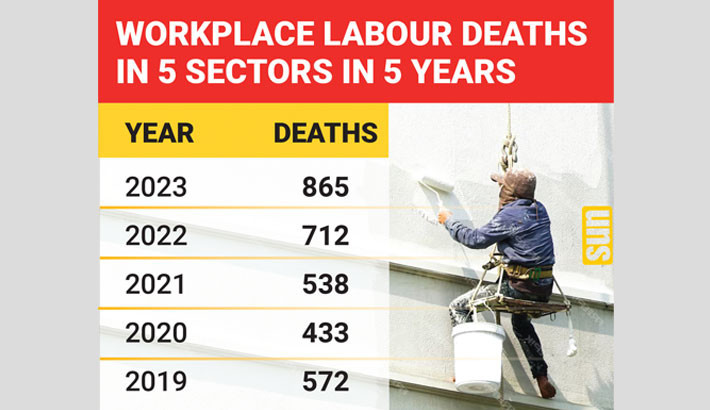Despite the global commitment to Sustainable Development Goal (SDG) 8, which emphasises safeguarding labour rights and fostering safe working environments, Bangladesh finds itself grappling with a concerning trend.
In the last 10 years, the nation has witnessed a stark rise in fatalities among its workforce, sparking alarm and raising serious questions about workplace safety standards. Tragically, this surge in casualties, exceeding 5,000 fatalities, and leaving a considerable number of workers injured, has been particularly pronounced across five key sectors – transportation, construction, services, manufacturing, and agriculture.
The failure to implement adequate safety measures within these industries has underscored a pressing need for urgent action to address the perilous conditions faced by workers nationwide.
A total of 5,225 labourers died between 2014 and 2023 in the five sectors in Bangladesh. Of them, 1,573 labourers died working in the transport sector, 1,396 in construction, 1,087 in service, 845 in manufacturing and 324 in the agriculture sector, according to the Safety and Rights Society.
The local not-for-profit organisation’s data also showed that 329 labours died in transport sector in 2023, 333 in 2022, 150 in 2021, 168 in 2020, 212 in 2019 while 173 workers died in construction sector in 2023, 104 in 2022, 139 in 2021, 118 in 2020, 130 in 2019 and 185 workers died in service sector in 2023, 170 in 2022, 86 in 2021, 86 in 2020, and 102 in 2019.
The data also showed that 96 workers died in the manufacturing sector in 2023, 43 in 2022, 111 in 2021, 45 in 2020, and 99 in 2019, while 82 labourers died in the agriculture sector in 2023, 62 in 2022, 52 in 2021, 16 in 2020, and 29 in 2019 in Bangladesh.
Talking to the Daily Sun, Safety and Rights Executive Director Sakendar Ali Mina informed that the death toll is much higher as many incidents are not reported by media. Some 85% of workers engaged in informal sectors. So data collection is impossible for us.
Sakendar also said there were 7.341 crore labourers in 2022 in the country as per the labour force survey published in 2023. Of them, 3.22 crore labourers were in Agriculture, 1.205 crore in industry or manufacturing, and 2.665 crore in the service sector of the country.
Who is responsible?
Sakendar claimed that the government, company owners and workers all are responsible for the casualties.
“As the government did not take tough action to implement labour rights, owners do not ensure safe workplaces. Labours are not aware either. So, I think all are responsible. All have to be cordial to increase awareness, strengthen monitoring system, and ensure labour standards,” he added.
Advocate AKM Nasim said the role of the Department of Inspection for Factories and Establishments should be activated to overcome the situation. “Safety issues should be prioritised for labourers to develop the sectors.”
Executive Director of Bangladesh Institute of Labour Studies Syed Sultan Uddin Ahmed said following the Rana Plaza incident, the International Labour Organisation declared workers’ occupational safety and health a fundamental right.
Industrial dispute raise
In the absence of labour law implementation, apathy of employers and unfriendly settlement procedures, industrial disputes are going up in the country. As a result, a huge number of cases have remained pending in labour courts, experts said.
According to Labour Appellate Tribunal (LAT) sources, 22,000 lawsuits are pending nationwide, with the Gazipur labour court alone shouldering 6,000 cases and the Dhaka LAT grappling with another 800. Most cases are related to wage and financial benefits.
Solidarity Centre Deputy Country Programme Director Monika Hartsel said even today, thousands of workers in the ready-made garment sector and various other industries lack access to safe and healthy workplaces.
District and Sessions Judge of LAT Dhaka MA Awal stressed the necessity of establishing a proactive committee to expedite case resolutions.
He cited an alarming example, noting that not a single case out of the 20 related to the Rana Plaza disaster has been disposed of in the past 11 years. In light of this, Judge Awal said it is important to foster a collaborative environment among all stakeholders involved in the judicial process.
SDG obstacles
Sumon said Bangladesh cannot achieve the goal by 2030 if the authorities concerned do not take proper initiative to protect labour rights and promote safe and secure working environments for all workers.
Kamrul Hassan, general secretary of the Akota Garments Workers Federation, underscored the importance of trade unions encompassing all sectors to uphold labour rights, thereby facilitating the achievement of SDGs and fostering industrial development.
Sunzida Sultana, additional executive director, said it is needed to address the plight of workers across all sectors. She highlighted the physical and mental hardships endured by labourers daily, which ultimately diminishes their productivity.
Sultana stressed the imperative of focusing on these issues to ensure the timely attainment of SDGs.


